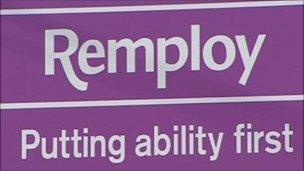Disabled fears over changes to Remploy
- Published

There are more than 400 workers at nine Remploy plants in Wales
A disabled man fears he will end "back on benefits" when changes to the employment company Remploy are made.
The first factory opened in Bridgend after World War II to offer employment and training to disabled servicemen.
Ministers are contemplating radical changes to the way the firm is funded and the workforce fears factory closures and job losses.
Roy Whitney, who has worked at the Neath Port Talbot base for 28 years, said: "Who wants to employ a bloke with one arm at 57 years of age? Nobody."
But some disability campaigners question whether sheltered employment has a place in the 21st Century.
BBC Wales Eye on Wales is examining both sides if the debate and asks: Is it time to pension off Remploy?
The first factory opened in Bridgend after World War II to offer employment and training to disabled servicemen.
Effective support
There are 54 Remploy businesses in the UK employing workers in enterprises from furniture and packaging manufacturing to recycling electrical appliances and operating CCTV systems and control rooms.
In Wales, nine factories, largely in and around the south Wales Valleys, employ more than 400.
Funding comes from the Department of Work and Pensions which gives £63m in support. That works out at around £23,000 a year for every employee.
That arrangement is under close scrutiny after a government-commissioned review recommended that, "government funding should be invested in effective support for individuals, rather than subsidising factory businesses".
Review author Elizabeth Sayce, chief executive of Radar, the Royal Association for Disability Rights, found that there was not enough work to go around Remploy and that about half its employees have no work to do.
Best use of money
She said: "It's really difficult when you look at some of the factories that are not doing well financially, because there is a pot of money there that is to support disabled people's employment."
"The difficulty is that if the government continues to spend about £25,000 per person simply because the actual business isn't viable, you do have to question 'is that the best use of money?', when you could support many more people for the same amount of money in viable businesses and enterprises."

Remploy was established in 1945 after the war
Elizabeth Sayce's recommendation is that viable Remploy factories should be encouraged to go it alone, free from government control, maybe as a workers' co-operative or social enterprise.
Where this is not an option, and businesses cannot continue, Remploy's workers should be offered support to secure alternative employment or training.
Its a prospect that alarms many of the workforce, including Unite union shop steward Mr Whitney who works in the head office of its furniture division on Baglan Energy Park.
Mainstream industry
With total unemployment close to 2.6m and youth unemployment heading towards a record high of 1m, he fears that Remploy workers will lose out if they find themselves on the jobs market.
"You are always going to get a certain type of disabled people that will never survive in mainstream industry," he said.
"So I'm going to be back at the end of the queue and back on benefits. It's going to cost the government more."
But the idea that government money follows individuals into jobs - through the expansion of schemes such as Access to Work - rather than workers following the money into Remploy factories does have the support of many disability organisations.
Rhian Davies, chief executive of Disability Wales, said: "Our society now is much more inclusive and the expectation is that people live in the community and have the support to do that and that should really be the same in employment."
"This isn't an easy solution but we'll never move to disabled people being fully included in society while we sustain segregated places."
'Good mix'
Public consultation on the Sayce Report is now closed. The Department of Work and Pensions is beginning to sift through the responses before the Minister for Disabled People, Maria Miller.
She has already said she is "attracted" to its recommendations but insists that the consultation is meaningful.
"We need to make sure there is a good mix of support for disabled people to be able to live independent lives in the future. Most disabled people I meet want to get into a job that is rewarding.
"I'm sure there won't be a "one size fits all solution". I can absolutely assure you that until we have gone through all of those responses no final decisions have been taken."
Eye on Wales is broadcast at 14.00 BST on Sunday 23 October on BBC Radio Wales
- Published5 August 2011
- Published23 August 2011